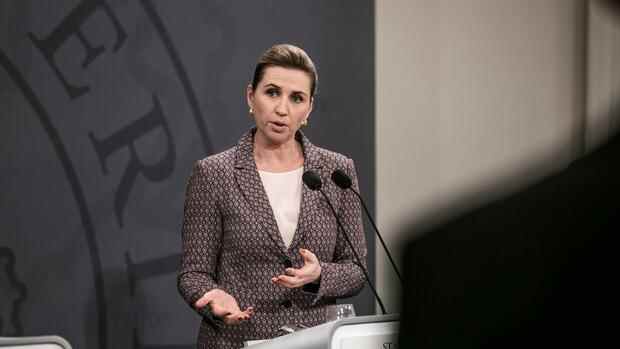In Denmark, the 7-day incidence is 913.
(Photo: AP)
Stockholm It was not Christmas messages that the Danish Prime Minister Mette Frederiksen brought her compatriots on Friday afternoon. Due to the dramatic increase in corona infections, theaters, cinemas, amusement parks and other meeting places will be closed from Sunday morning. Restaurants and bars are no longer allowed to serve alcohol after 10 p.m., and they have to close completely after 11 p.m. Depending on the size, shops are only allowed to let in a limited number of customers.
“We are in a critical phase,” said Frederiksen, explaining the new restrictions, which she described as “painful”. She also urged her compatriots for a third vaccination. Parliament confirmed the new restrictions on Friday afternoon.
The small kingdom, which until recently was envied for its fast and successful vaccination campaign, has developed into a European hotspot for the corona pandemic in the past two weeks. The State Serum Institute (SSI) has to report around 10,000 new infections every day. And there is still no improvement in sight. “We assume that the infection rate will continue to rise if we do nothing,” said Henrik Ullum, head of the SSI. His institute advised the government and recommended the new restrictions.
This puts Denmark in reverse. It was only in September that the government lifted the restrictions and downgraded Covid-19 from a “threat to society as a whole” to a “serious infectious disease”. Public life took place again almost as usual. The easing could be introduced because Denmark had a relatively high vaccination rate of over 70 percent compared to many other EU countries. In the meantime, more than 77 percent of the population have been vaccinated at least twice.
Top jobs of the day
Find the best jobs now and
be notified by email.
Nevertheless, the Omikron variant nullified all predictions about the further course of the pandemic. It spread at record speed across the country, and experts predict that it will be the dominant type of virus in just a few days. The seven-day incidence in Denmark is now 913. That is why Denmark has significantly increased the pace of booster vaccinations.
Superspreader event burdens Norway
There is a similar development in Norway. The country lifted most of the restrictions two months ago due to a sharp drop in the number of infections. But two weeks ago the new government of Prime Minister Jonas Gahr Støre had to row back. “The situation is grave,” he said, referring to an average of almost 5,000 new infections per day and a seven-day incidence of 615.
The trigger for the sharp increase in new infections was a company party at the Louise restaurant in Oslo at the beginning of the month. 120 employees from an Oslo company celebrated there. People danced and sang exuberantly. Everyone involved was vaccinated. But several employees of the company had returned from South Africa shortly before the company party. They had brought the Omicron virus to Norway unnoticed. “The evening at the Louise was a superspreader event,” said a spokesman for the health authority. 81 employees of the company and a further 64 restaurant guests became infected.
Alcohol was completely banned across the country for a month. In addition to a mask requirement, work should be done in the home office again. There are also assembly restrictions: no more than 20 people are allowed in closed rooms, 50 are allowed outdoors. The national health authority FHI assumes that the Omikron variant will be the dominant one in Norway by Christmas.
Sweden relies on recommendations
The situation in Sweden and Finland is much quieter. Both countries have recorded a sharp increase in new infections in the past few days, but from a low level. In Finland the seven-day incidence is currently 216, in Sweden 203. Sweden’s chief epidemiologist Anders Tegnell warned against overly optimism. He recalled that Sweden always lagged behind other European countries for a few weeks in the second and third waves. In the past few days, increasing admissions have been reported from the hospitals. Some hospitals are already at their capacity limit again.
The government therefore tightened its recommendations last week. In full buses and trains, passengers should wear a mask. For events with more than 100 people in closed rooms, a vaccination certificate must be presented for the first time since the outbreak of the pandemic. Sweden, which has never decided on a complete lockdown, has so far relied on recommendations instead of regulations to combat the Omikron variant. It is suggested to employers that they should increasingly enable the home office again.
If Omikron continues to spread, the government has announced further measures. This can include restricted opening times for restaurants and the suspension of sporting events. Similar measures apply in Finland. In addition, advice is being given about extending the Christmas holidays, as a particularly large number of children have become infected.
More: Magdalena Andersson re-elected Sweden’s Prime Minister
